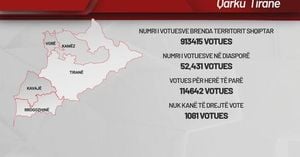Tensions between India and Pakistan have escalated dramatically following a series of military exchanges, with both countries claiming significant losses. The conflict, which has been brewing for years, reached a boiling point after India launched a military operation targeting militant groups in Pakistan, resulting in an intense response from the Pakistani military.
On May 6, 2025, India initiated "Operation Sindoor," aimed at dismantling nine militant groups, including Jaish-e-Mohammed and Lashkar-e-Taiba, which India accuses of orchestrating a deadly attack on Hindu tourists in Kashmir that left 26 people dead on April 22. In retaliation, Pakistan claims to have shot down five Indian aircraft, marking one of the most severe confrontations between the two nuclear-armed nations in over two decades.
Pakistan's Prime Minister Shehbaz Sharif warned that India would "definitely be responded to severely" for its military actions, asserting that the country would not back down. He stated, "India will pay a heavy price for this grave mistake... They might think we will retreat, but this is the spirit of the Pakistani people who never give up." Meanwhile, Pakistan's Defense Minister emphasized that their retaliation would target only military objectives, avoiding civilian casualties.
The situation has led to significant military activity along the Line of Control (LoC), with artillery exchanges resulting in multiple casualties. Reports indicate that at least 13 Indian soldiers and six Pakistani soldiers have died in the recent clashes, with many more injured. In addition, civilian areas have been affected, with Pakistan reporting at least 31 civilian deaths and 46 injuries due to Indian missile strikes.
As the conflict escalated, air traffic in the region was severely disrupted. Flightradar24 reported that flights from India and Qatar were being diverted due to the heightened tensions and airport closures in Pakistan. Thai Airways also announced adjustments to their flight paths to avoid the South Asian airspace, which has become increasingly dangerous.
In the wake of these events, the international community has expressed concern over the potential for a broader conflict. Leaders from the United States, China, Russia, and the United Nations have called for both nations to exercise restraint and avoid a full-blown war. U.S. President Donald Trump stated, "I would like to see them end this, and if I can help in any way, I would be glad to do so."
The economic ramifications of the conflict have been immediate. Pakistan's stock market initially plummeted by over 6% before recovering slightly, while India's market remained relatively stable. However, the Indian rupee has weakened significantly, hitting a one-month low against the dollar. The ongoing violence has prompted several airlines to cancel or reroute flights, further straining the travel industry.
As both nations continue to exchange fire, the risk of a larger regional conflict looms large. Analysts warn that if the situation is not de-escalated, it could lead to a new era of instability in South Asia, particularly given both countries' nuclear capabilities. The potential for miscalculation remains high, and the international community is watching closely.
As this situation develops, both sides remain entrenched in their positions, with India asserting that its military actions are necessary to combat terrorism, while Pakistan maintains that it is defending its sovereignty against aggressive incursions. The coming days will be crucial in determining whether diplomatic efforts can be revived to prevent further escalation.



